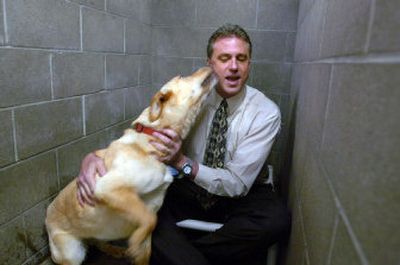Director named to humane society

The Kootenai Humane Society has hired its first-ever executive director, choosing a veteran animal shelter executive who lost his past two jobs and then sued a former employer for nearly $400,000.
Phil Morgan, 44, was selected from among about 40 applicants for the position, said Andy Smith, president of the nonprofit agency’s board of directors. Smith said organizers were satisfied with Morgan’s explanation of problems he had as director of the Escondido Humane Society in Southern California and at the Second Chance Center for Animals in Flagstaff, Ariz.
“His experience was head and shoulders above the rest,” Smith said Tuesday. “His successes far outweighed the issues.”
Smith said the humane society needed a seasoned leader to help the agency cope with the effects of a burgeoning population of people – and their pets.
“We wanted to be proactive, not reactive,” he said. “There are 5,000 animals relinquished in this county every year.”
Morgan said he convinced organizers he had the vision and energy to tackle the job, despite admitted conflicts with board members that forced his departure from his past two positions.
“We just had some differences in philosophy,” he said.
Smith said Morgan indicated that his previous board members had asked him to commit illegal acts, an allegation disputed by officials in Escondido and Flagstaff.
“That’s simply not true,” said Leslie Anne Mogul, past chairwoman of the board of directors for the Escondido group.
“I can assure you that’s not the case,” said Roger Naumann, interim director of the Flagstaff agency. “I don’t know what kind of diligence (Kootenai officials) did in their own homework.”
Morgan was director for seven years in Escondido, earning more than $62,000 a year, before board members declined to renew his contract in April 2005, records showed. He said he turned around an agency on the verge of bankruptcy, building it into an organization with a $2.2 million annual budget and restoring it after a devastating arson in 2001. Morgan said he raised more than $4 million in private and community donations after the fire, which destroyed the building and killed more than 100 animals.
In January, he sued the Escondido agency’s board of directors for nearly $400,000 in unpaid bonuses he said was owed to him. Morgan’s suit alleges the agency failed to honor a contract that promised him deferred compensation, San Diego Superior Court records show.
Mogul said she could not comment on pending litigation.
Morgan worked at the Flagstaff agency for five months, from July to November 2005, earning a salary of about $70,000 a year. He said he left the organization, which has an annual budget of about $1.2 million, by mutual decision. Naumann, the interim director, said Morgan “was not eligible for rehire.”
Since November, Morgan said, he has worked as a consultant for more than a dozen animal care agencies nationwide. He declined to name the agencies, citing client confidentiality.
Morgan wouldn’t discuss specific points of contention with previous board members, either. His application for the local position, however, included a frank summary of his view of “no kill” policies at shelters nationwide.
” ‘No kill’ is an issue of semantics,” said Morgan. ” ‘No kill’ has as many different meanings as there are shelters.”
Many shelters euthanize animals and still call themselves “no kill” facilities, Morgan noted. He plans to develop firm criteria for labeling animals as adoptable or not and for euthanizing when necessary.
At the Kootenai Humane Society, Morgan’s new five-year contract includes a salary of more than the $45,000 organizers expected to pay a new director. Neither Morgan nor Smith would disclose the negotiated amount, which will be paid from the organization’s annual budget of about $700,000.
One of Morgan’s first goals will be to develop a capital campaign for a new shelter center, which Smith estimated could cost between $2.5 million and $3 million. Morgan is also charged with revamping and updating the 30-year-old agency that has been run with volunteers and short-term paid managers.
“There’s an operation here, and it functions,” Morgan said. “There’s a lot of room for improvement in North Idaho shelters.”